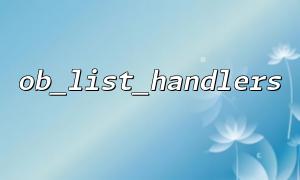Output buffer management is a very important part of PHP programming. It allows developers to control the output flow, delay sending data and modifying the output at the appropriate time. However, when using the output buffering function, there are sometimes cases of "missing" or "lost" buffering handlers, which often leads to unpredictable output behavior or performance issues.
ob_list_handlers is a PHP function that helps developers view the currently active output buffer handler. If we encounter problems with missing or missing output buffer handlers, ob_list_handlers can be a powerful tool for troubleshooting and fixing problems. This article will explain how to use this function to find and fix these missing handler issues.
In PHP, the output buffer allows you to process data before it is actually sent to the browser. By starting the output buffer with ob_start and closing the buffer with ob_end_flush or ob_end_clean , developers can modify the output in the buffer, reduce unnecessary output operations, and optimize response speed.
The problem of missing output buffer handlers usually occurs in the following situations:
Not properly managed when multiple calls to ob_start : If multiple buffers are started and they are not closed or cleaned in the correct order, missing handlers may occur.
Buffer not closed in time : Ob_start is called but ob_end_flush or ob_end_clean is not called correctly, which may cause the buffer to not be cleaned and the handler not be removed.
Error buffering hierarchy management : When using multiple buffers in nest, there may be an issue where the handler fails to close or manage in order.
The ob_list_handlers function returns a list of currently active output buffer handlers. The return value of this function is an array containing the name of each buffer handler.
<?php
// View the currently active output buffer handler
$handlers = ob_list_handlers();
// Output all buffering handlers
print_r($handlers);
?>
The above code prints out all output buffer handlers currently active. In this way, developers can see if there is currently an unclosed buffer.
If we find that there is a missing output buffer handler, we can take the following steps to fix it:
Close the buffer correctly : Make sure that ob_end_flush or ob_end_clean is called in the right place every time you call ob_start .
Example:
ob_start(); // Start buffering
// Perform output operations
ob_end_flush(); // Make sure the buffer data is output and closed
Check the buffer hierarchy : If you use multiple layers of buffering in your code, make sure each layer is closed correctly. You can check the number of current buffer layers through the ob_get_level() function and make sure that each layer can be closed sequentially.
Example:
while (ob_get_level() > 0) {
ob_end_flush(); // Close all buffers in turn by hierarchy
}
Debug Output Buffer : If you still can't find out the missing handler, debug the output of ob_list_handlers and check if it shows unnecessary buffering layers. Make sure no buffering is started when not required.
ob_list_handlers is a very practical tool that helps developers quickly diagnose and fix output buffer handler issues due to omissions or error management. By rationally using ob_start , ob_end_flush , and ob_end_clean , and by debugging the output buffering hierarchy, developers can better control PHP output buffering behavior, optimize application performance and avoid potential output errors.















